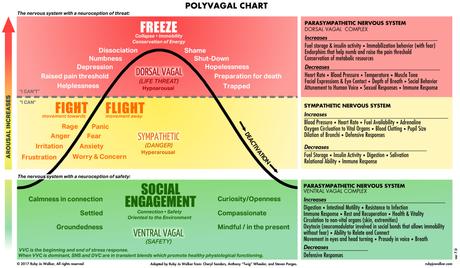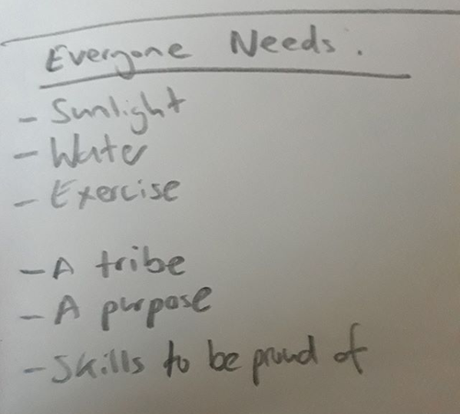The Polyvagal Theory came about as a result of the work & research carried out by Dr Stephen Porges. It relates to the different levels of activation of the vagus nerve and the physical & mental states that occur as a result.
Poly means “many”, Vagal means/relates to the “Vagus Nerve”.
The theory helps to explain why so many people have issues with digestion and also muscle tension resulting in back pain, neck pain, headaches etc.
The theory also explains how we find safety and how we respond to danger.
The Vagus Nerve is part of our “parasympathetic nervous system” – the section of the nervous system that relaxes us. As opposed to the “sympathetic nervous system” which prepares the body & mind for action.
This really helped explain to me what was going on – I’ve never really had negative thoughts as such, but in the past have had terrible issues with digestion and muscle tension & pain. I was really confused when I was told that there was effectively nothing wrong with me and prescribed anti-depressants…
3 Circuits of the Polyvagal System
The polyvagal system can be divided into 3 circuits or 3 states.
Immobilisation –
Freeze, Shut down, heart rate lowers, lowered blood pressure, influences the gut & digestion – part of the ‘dorsal vagas system’.
If you are in this “freeze” state for prolonged periods of time, you may get gut issues such as IBS and allergies.
It can also cause shortness of breath and heart rate variability issues which in turn often leads to panic attacks.
Social Engagement & Connection
Low tone dorsal vagus nerve stimulation. This is the ‘nice’ state to be in – “rest & digest”. This helps support the immune system, digestion and is a state of relaxation. You need to engage with people who make you feel ‘safe’ in an environment that you feel comfortable in.
Social engagement activates the Ventral Vagus Branch of the Parasympathetic Nervous System. It connects directly to the heart and lowers the heart rate. This is stimulated by connection with other people and supports the immune system, digestion and general recovery of the body. Loneliness and isolation are bad for your health in general because they result in less stimulation of the Ventral Vagus Branch
Mobilisation (Fight, Flight) –
Fight, flight, but also ‘healthy’ energy to get stuff done and to get out of bed in the morning. This system increases your heart rate, increases oxygen circulation and awareness.

Trauma & The Polyvagal Theory
Trauma can cause us to be stuck in the “Mobilisation” mode or, more commonly the “Immobilisation” or “Freeze” state. This ‘high tone dorsal’ impacts digestion and muscle tension causing pain and issues such as IBS and reflux.
Unresolved trauma can cause us to stay in the Freeze state for years, instead of minutes! I was surprised to read that trauma can occur when you are a baby; before you even have what we would call a ‘memory’. I guess the primal nervous system remembers more than our conscious mind does.
The exercises below can help the body to deal with this trauma. But also take a look at all the research on psychedelics & MDMA for mental health. These seem to bypass the ego and help deal directly with trauma. The experience has to be ‘guided’ however, as people need to deal with and process the trauma which can be very frightening.
More info on the MAPS website here.
Polyvagal Theory Exercises
Peripheral Vision exercise – also known as “The Basic Exercise”
- Sit down, with a straight back & look forwards
- Place your hands behind your head with your elbows out towards the sides
- Look forwards
- Slowly rotate your head side to side, looking left and then right
- Look forwards again
- Face forwards but avert your gaze/line of vision to the right – don’t strain
- See if you can pick out your right elbow in your peripheral vision
- Keep gazing to the right, without straining and pick out your elbow in your periphery.
- Do this for up to 1 minute- you should feel a sense of relaxation, a sigh, or a gulp
- Repeat on the left hand side
- When you have finished, slowly rotate your head to the left and right sides again
Breathing Exercises
- Breathe in through the nose for 4 seconds
- Hold your breathe for 6 seconds
- Breathe out – with some force – for 8 seconds
- Repeat 10 times
Listen to Contemporary Music by Female Singers
Not sure why exactly, but listening to contemparay music can help put you in the ‘rest & digest’ state. Perhaps it’s a mum-thing.
Nutrition & Polyvagal System
If you have GI issues, dietary changes, in my experience, can make a huge difference.
Consult your Doctor before making changes to your diet
- Dairy
Dairy protein – casein and dairy carbohydrate – lactose – are relatively hard to digest. If you have IBS try cutting down or even cutting out dairy for a few days. If you also have sinus problems, this can be a game changer and helps a lot with ‘brain fog’. - Gluten
Only a small percentage of the population are allergic to gluten but many people have problems digesting it. This is possibly a combination of people being stressed and in “freeze” state, but also different growing techniques which make crops more robust but harder to digest. Try cutting down for a few days and see if you have any improvement. - FODMAPs
A healthy diet, typically consists of lots of fruits and vegetables. Unfortunately the carbohydrates can be relatively hard to digest. Foods containing FODMAPs include onions, garlic and apples. FODMAPs are the carbohydrates that the foods contain, including lactose and frutose. They can pull water into the large intestine and cause gas and bloating. Low FODMAP diets are not supposed to be long term.
- Magnesium & Glycine
If you have problems with muscle tension, I’ve personally found Magnesium Glycinate and glycine to help a great deal, especially with sleep. The form of magnesium really makes a difference, magnesium oxide does nothing to help. - Acidic Foods
Finally if you have acid reflux issues, consider cutting out citrus fruits and tomatoes. Activated charcoal & fiber supplements can help with reflux. More info in my previous blog post here. - Curcumin & Turmeric
There’s a strong link between mental health issues and inflammation. There’s also a strong link between gut health issues and inflammation. Turmeric (take with black pepper) can health with both inflammation and gut issues. I use Longvida Curcumin along with around 5g of turmeric per day. Curcumin is the most potent ‘active ingredient’ in turmeric, but it is expensive. Make sure your turmeric is tested for heavy metal/lead content.
More info on inflammation & mental health here on the psychiatric times
I think the theory, and the part about social engagement, might help explain why COVID-19 lockdown has been so hard for many.
If you have mental health problems, get help, eat well, try and avoid drinking too much and addictive drugs as this is a downhill spiral to say the least and do your best not to project your feelings on people. The new treatments on the horizon, do look extremely promising, so if conventional treatment doesn’t help, don’t give up hope!


